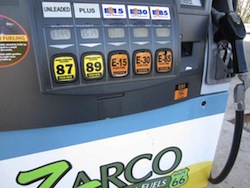The American Petroleum Institute (API), released a new E15 study today and representatives of all the major ethanol industry associations issued statements. In addition, the Renewable Fuels Association (RFA) held a media conference to discuss why the study oil-funded study was “flawed” and “misleading”. Ethanol experts Kristy Moore, Vice President for Technical Services for RFA, along with Bob Reynolds, President of Downstream Alternatives, Renewable Fuels, noted that with nearly 100 studies on E15, it is the most tested fuel in the history of the country.
 Moore said she recently called the EPA and asked them how many fuel additive applications they get a year and they get more than 500 that would be nearly identical to the E15 additive applications. This has been the norm, she said, since the fuel additive program began in 1974. It is my contention, she continued, and is well documented, that no fuel additive has been studied in history to such as rigorous degree as E15.
Moore said she recently called the EPA and asked them how many fuel additive applications they get a year and they get more than 500 that would be nearly identical to the E15 additive applications. This has been the norm, she said, since the fuel additive program began in 1974. It is my contention, she continued, and is well documented, that no fuel additive has been studied in history to such as rigorous degree as E15.
The burning question, said Moore, is why are we talking about a specific CRC fuel system report and what is the significance? She said there were a few observations that they wanted to point out including: the two CRC AVFL 15 test programs confusingly utilized very different fuel sets to evaluate fuel systems and the aggressive test fuel formulation and level of ethanol concentration is highly questionable as relevant to E15.
Reynolds pointed out that this study, along with API’s earlier study, selected components that they knew would be sensitive to higher levels of ethanol so you should expect some of the results the study had.
While in general the study was not supportive of E15, Moore said that there were some data gems buried within the research.
Listen to the full press conference here that includes more in-depth discussion of observations made by Moore and Reynolds: Ethanol Industry Responds to API E15 Study

